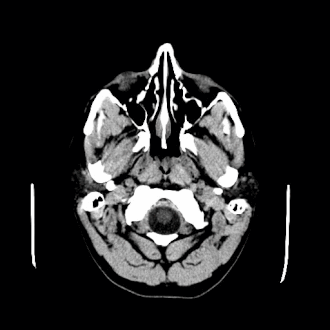Central nervous system cyst

Editor-In-Chief: Prab R Tumpati, MD
Obesity, Sleep & Internal medicine
Founder, WikiMD Wellnesspedia &
W8MD's medical weight loss NYC, sleep center NYC
Philadelphia medical weight loss and Philadelphia sleep clinics
| Central nervous system cyst | |
|---|---|

| |
| Synonyms | N/A |
| Pronounce | N/A |
| Specialty | N/A |
| Symptoms | Headache, seizures, nausea, vomiting, balance disorder, vision problems |
| Complications | Hydrocephalus, brain herniation |
| Onset | Varies, can be congenital or acquired |
| Duration | Can be chronic |
| Types | Arachnoid cyst, colloid cyst, dermoid cyst, epidermoid cyst |
| Causes | Developmental anomaly, trauma, infection, tumor |
| Risks | Genetic predisposition, head injury |
| Diagnosis | MRI, CT scan |
| Differential diagnosis | Brain tumor, abscess, hematoma |
| Prevention | N/A |
| Treatment | Surgical intervention, endoscopic fenestration, shunt placement |
| Medication | Anticonvulsant, analgesic |
| Prognosis | Varies, generally good with treatment |
| Frequency | Rare |
| Deaths | Rare, usually due to complications |


Central nervous system cyst is a pathological condition characterized by the presence of a fluid-filled sac, or cyst, within the central nervous system (CNS). The CNS consists of the brain and spinal cord, and any cystic formation within these structures can lead to a variety of neurological symptoms.
Types of Central Nervous System Cysts[edit]
There are several types of CNS cysts, each with unique characteristics and potential complications. These include:
- Arachnoid cysts: These are the most common type of CNS cysts. They form in the arachnoid membrane, one of the three layers of tissue that cover the brain and spinal cord.
- Colloid cysts: These cysts typically occur in the third ventricle of the brain and can block the flow of cerebrospinal fluid, leading to increased intracranial pressure.
- Dermoid cysts and Epidermoid cysts: These are congenital cysts that are typically present at birth. They result from the inclusion of ectodermal tissue during neural tube closure.
- Pineal cysts: These cysts occur in the pineal gland, a small endocrine gland in the brain. Most pineal cysts are asymptomatic and discovered incidentally.
Symptoms[edit]
The symptoms of a CNS cyst depend on its size and location. Small cysts may not cause any symptoms and may be discovered incidentally during imaging studies for other conditions. Larger cysts, or those located in certain areas of the brain or spinal cord, can cause symptoms such as headache, seizures, vertigo, and neurological deficits.
Diagnosis[edit]
Diagnosis of a CNS cyst typically involves imaging studies such as magnetic resonance imaging (MRI) or computed tomography (CT) scans. These studies can reveal the presence, size, and location of the cyst. In some cases, a lumbar puncture may be performed to analyze the cerebrospinal fluid.
Treatment[edit]
Treatment for a CNS cyst depends on the type of cyst, its size, and the symptoms it is causing. Options may include observation, medication to control symptoms, or surgery to remove the cyst.
Central_nervous_system_cyst gallery[edit]
-
Human brain showing a colloid cyst in the third ventricle
-
Colloid cyst CAT scan
See Also[edit]
Ad. Transform your life with W8MD's Budget GLP-1 injections from $75


W8MD offers a medical weight loss program to lose weight in Philadelphia. Our physician-supervised medical weight loss provides:
- Weight loss injections in NYC (generic and brand names):
- Zepbound / Mounjaro, Wegovy / Ozempic, Saxenda
- Most insurances accepted or discounted self-pay rates. We will obtain insurance prior authorizations if needed.
- Generic GLP1 weight loss injections from $75 for the starting dose.
- Also offer prescription weight loss medications including Phentermine, Qsymia, Diethylpropion, Contrave etc.
NYC weight loss doctor appointmentsNYC weight loss doctor appointments
Start your NYC weight loss journey today at our NYC medical weight loss and Philadelphia medical weight loss clinics.
- Call 718-946-5500 to lose weight in NYC or for medical weight loss in Philadelphia 215-676-2334.
- Tags:NYC medical weight loss, Philadelphia lose weight Zepbound NYC, Budget GLP1 weight loss injections, Wegovy Philadelphia, Wegovy NYC, Philadelphia medical weight loss, Brookly weight loss and Wegovy NYC
|
WikiMD's Wellness Encyclopedia |
| Let Food Be Thy Medicine Medicine Thy Food - Hippocrates |
Medical Disclaimer: WikiMD is not a substitute for professional medical advice. The information on WikiMD is provided as an information resource only, may be incorrect, outdated or misleading, and is not to be used or relied on for any diagnostic or treatment purposes. Please consult your health care provider before making any healthcare decisions or for guidance about a specific medical condition. WikiMD expressly disclaims responsibility, and shall have no liability, for any damages, loss, injury, or liability whatsoever suffered as a result of your reliance on the information contained in this site. By visiting this site you agree to the foregoing terms and conditions, which may from time to time be changed or supplemented by WikiMD. If you do not agree to the foregoing terms and conditions, you should not enter or use this site. See full disclaimer.
Credits:Most images are courtesy of Wikimedia commons, and templates, categories Wikipedia, licensed under CC BY SA or similar.
Translate this page: - East Asian
中文,
日本,
한국어,
South Asian
हिन्दी,
தமிழ்,
తెలుగు,
Urdu,
ಕನ್ನಡ,
Southeast Asian
Indonesian,
Vietnamese,
Thai,
မြန်မာဘာသာ,
বাংলা
European
español,
Deutsch,
français,
Greek,
português do Brasil,
polski,
română,
русский,
Nederlands,
norsk,
svenska,
suomi,
Italian
Middle Eastern & African
عربى,
Turkish,
Persian,
Hebrew,
Afrikaans,
isiZulu,
Kiswahili,
Other
Bulgarian,
Hungarian,
Czech,
Swedish,
മലയാളം,
मराठी,
ਪੰਜਾਬੀ,
ગુજરાતી,
Portuguese,
Ukrainian


